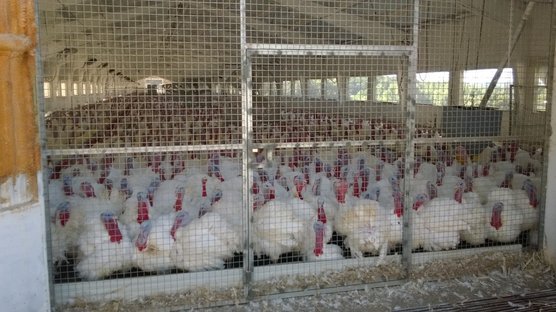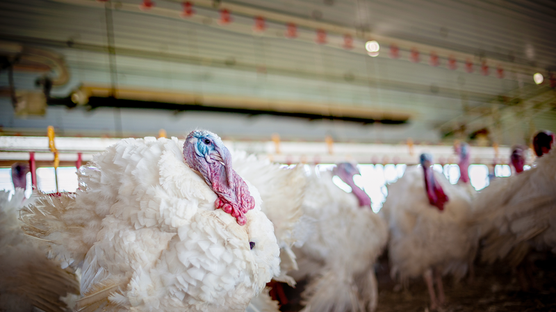Published on June 26, 2018
Challenges in formulating commercial turkey feeds without animal by-products
Proper feeding and management of commercial turkeys is necessary to satisfy market demands for turkey meat. Market demand can differ based on geographic region, cultural differences and consumer preferences. These differences can include carcass specifications, further processing of turkey meat, turkey housing and management systems, flock medication use, and the composition of feed. Formulating feeds to satisfy a particular market is not as easy as duplicating feeds from a different market. It is also possible that the feed nutrient composition may differ based on consumer market demands.
One market demand, that is becoming more prevalent on a global scale today, is raising turkeys on an all vegetable diet. This means that the feed does not contain any animal by-products. In general, these diets are requested either due to government regulations or to satisfy consumer preferences. When creating new feed formulas for turkey flocks, for any reason, a nutritionist must ensure that the feed will result in acceptable growth of turkeys, good flock health, dry barn conditions, and provide economic return on investment.
Managing Moisture
The number one challenge to formulating feeds that are free of animal by-products is to ensure that the feed will not cause additional moisture to accumulate in the barn. Wet litter conditions can result in poor growth of the flock, increased disease incidence, lameness, body weight variability, and carcass condemnation. To ensure that the new diet does not increase moisture levels in the barn, nutritionists must consider various causative factors. These factors may be more important to consider in comparison to feeds formulated with meat meal and other animal by-products.
Certainly, the first thing a nutritionist should consider are the levels of sodium and chloride in the feed as the concentration of these minerals are positively correlated to the level of moisture in turkey droppings. The concentrations of these minerals in feed will likely need to be reduced compared to those levels that are present in feeds formulated with animal by-products. Typical sodium levels used in animal by-product free feeds would be 0.15-0.17%. Chloride would be the same concentration or as much as 0.03% higher than sodium. It is important in formulating feeds to ensure that sources of sodium or chloride are accurate for all ingredients in the feed. For example, if lysine-HCl is used as an ingredient in the feed, it should have a chloride value used to formulate feeds to avoid under-estimating total chloride concentration in feed.
Calcium and phosphorus levels in feed must also be considered, as excessive amounts of these minerals can cause barn moisture levels to increase. Hybrid Turkeys has completed three trials that showed calcium and phosphorus levels can be significantly reduced, in animal by-product free diets fed to commercial turkeys without compromising growth or performance.
The addition of enzymes to feed is critical to the success of any feed program without use of animal by-products. Feeds should contain a mixture of enzymes that include various carbohydrases and proteases. These enzymes help turkeys to better digest and utilize feed components. Phytase addition to feed is also beneficial for better phosphorus utilization, and for improved digestive system health. All enzymes in feed must be routinely analysed in order to ensure their adequacy. Other feed additives can be considered, but they must provide economic return regardless of their cost. For example, some nutritionists find that that adding betaine to feed results in a reduction of barn moisture levels.
The particle size of grains added to feed is an important consideration when formulating feeds without animal by-products. A larger grain particle size can increase the time of feed transit through the digestive system because of its longer retention time in the gizzard. This results in more time for nutrient absorption from the digestive system. This reduces the osmotic effect some unabsorbed nutrients may have in the intestines, which can contribute to increased fecal moisture. In pelleted or crumbled feeds, 10-20% of the feed, as corn, is coarsely ground to 900-1200 micron and pelleted as such with the remaining part of the feed. This has a positive effect in reducing barn moisture levels. In wheat based diets, 5-15% whole wheat is pelleted with the remaining part of the diet to provide some coarseness to help reduce barn moisture levels.
Starter feeds for turkeys should be carefully formulated to ensure that the amount of soybean meal added to feed does not contribute to wet and sticky fecal droppings. Soybean meal added in excess of 44% to feed can result in wet and sticky fecal droppings due to undigested carbohydrates present in soybean meal. This can increase barn moisture and cause footpad dermatitis in turkeys. Alternative protein sources such as rapeseed meal or corn gluten meal can be used as an alternative to adding an over-excessive amount of soybean meal to feed. Alternatively, if soybean meal is the only protein source available, it may be necessary to formulate the turkey starter feeds at amino acid concentrations below Hybrid Guideline levels to avoid the problem of wet and sticky fecal droppings.
Energy levels
Energy levels are usually lower in vegetable diets compared to feeds that contain animal by-products. This is expected as more limestone and inorganic phosphate minerals are added to feed in the absence of meat meal. The addition of vegetable oil to feed could add more energy to the diet; however its use is limited by economics, feed handling concerns and pellet durability.
Additional considerations
In any feed formula, nutritionists should carefully consider vitamin levels added to feed, as this can greatly affect skeletal development and overall flock performance. Mycotoxins should be monitored, especially when changing to a new crop-year, to avoid poor performance. Mycotoxins at high levels can negatively compromise the integrity of the digestive system and immune system of the poult. Other considerations during formulation should include water mineral content and water sanitation. Excessive sodium in water may require the formulation of feeds to lower sodium levels. Improper water sanitation can completely eliminate the benefits obtained from excellent feed formulation and manufacturing.
Summary
Formulating feeds without animal by-products can be done successfully by recognizing the various risk factors associated with such feeds. Such feeds are not simply formulated with the same approach or prior thought as for feeds formulated with meat meal and other animal by-products. Carefully formulating turkey feeds to limit the assumed risk associated with any feed program is the best approach to grow turkeys for any consumer market successfully.



